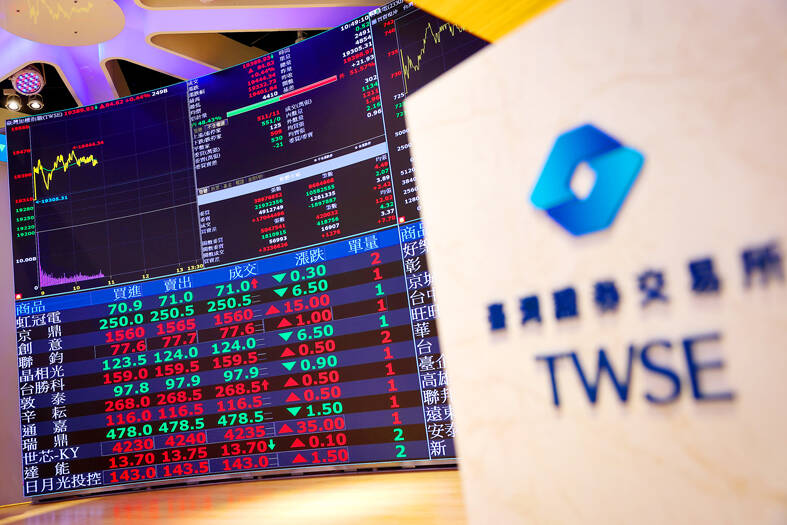The TAIEX remains attractive this quarter and beyond after rallying above the 20,000 points last quarter, as major local firms would benefit further from artificial intelligence (AI) investment by global technology titans, analysts said.
US technology giants Microsoft Corp, Amazon.com Inc, Meta Platforms Inc and Alphabet Inc have increased AI spending, which might total US$175.9 billion this year, a 23 percent gain from a year earlier, Nomura Asset Management Taiwan Ltd (野村投信) said in a note.
The money would ramp up business at all firms on the global AI supply chain, of which Taiwan is an important part and the nation’s significance would not be ignored, Nomura Asset Management Taiwan said.

Photo: CNA
That explained why foreign portfolio managers have increased holdings in local shares by a net NT$160 billion (US$4.99 billion) so far this year, Nomura said.
The fund flows would continue, even though local shares have grown increasingly expensive with the price-to-earnings ratio rising above the five-year average of 18, it said, attributing its confidence to the expectation that corporate earnings would rise 30 percent this year.
In particular, Taiwanese semiconductor firms command global leadership positions in technology processes, enabling them to take part in the supply of cloud computing and AI services, two megatrends of the foreseeable future, Nomura said.
Taiwan Semiconductor Manufacturing Co (TSMC, 台積電), the world’s largest advanced chipmaker, on April 18 is to report its first-quarter financial situation and give guidance on its business prospects.
TSMC yesterday said it would stick to its financial forecast for the whole year of this year, as most of its manufacturing equipment has resumed operations.
The world’s biggest contract chipmaker said in January that revenue this year would grow by at a low-to-mid-20s percentage from last year in US dollar.
Nomura said that demand for AI chips would exceed supply this year and the imbalance would continue into next year.
The TAIEX would receive additional support later this month and in May from the advent of new funds targeting local shares highlighting growth momentum and high dividends, analysts said.
Mega Investment Trust Corp (兆豐投信), Fuh Hwa Securities Investment Trust Co (復華投信) and Nomura Asset Management Taiwan are to raise money later this month in an apparent bid to copy the successful models of exchange-traded funds.
The cash would boost prices of component shares, which is what happened last month, with more than NT$200 billion poured into shares that promised high dividends.
KGI Securities Investment Trust Co (凱基投信), Taishin Investment Trust Co (台新投信) and Shin Kong Investment Trust Co (新光投信) are waiting for regulatory approval to launch similar products, which are a fast-growing source of fee income.

To many, Tatu City on the outskirts of Nairobi looks like a success. The first city entirely built by a private company to be operational in east Africa, with about 25,000 people living and working there, it accounts for about two-thirds of all foreign investment in Kenya. Its low-tax status has attracted more than 100 businesses including Heineken, coffee brand Dormans, and the biggest call-center and cold-chain transport firms in the region. However, to some local politicians, Tatu City has looked more like a target for extortion. A parade of governors have demanded land worth millions of dollars in exchange

An Indonesian animated movie is smashing regional box office records and could be set for wider success as it prepares to open beyond the Southeast Asian archipelago’s silver screens. Jumbo — a film based on the adventures of main character, Don, a large orphaned Indonesian boy facing bullying at school — last month became the highest-grossing Southeast Asian animated film, raking in more than US$8 million. Released at the end of March to coincide with the Eid holidays after the Islamic fasting month of Ramadan, the movie has hit 8 million ticket sales, the third-highest in Indonesian cinema history, Film

Taiwan Semiconductor Manufacturing Co’s (TSMC, 台積電) revenue jumped 48 percent last month, underscoring how electronics firms scrambled to acquire essential components before global tariffs took effect. The main chipmaker for Apple Inc and Nvidia Corp reported monthly sales of NT$349.6 billion (US$11.6 billion). That compares with the average analysts’ estimate for a 38 percent rise in second-quarter revenue. US President Donald Trump’s trade war is prompting economists to retool GDP forecasts worldwide, casting doubt over the outlook for everything from iPhone demand to computing and datacenter construction. However, TSMC — a barometer for global tech spending given its central role in the

Alchip Technologies Ltd (世芯), an application-specific integrated circuit (ASIC) designer specializing in server chips, expects revenue to decline this year due to sagging demand for 5-nanometer artificial intelligence (AI) chips from a North America-based major customer, a company executive said yesterday. That would be the first contraction in revenue for Alchip as it has been enjoying strong revenue growth over the past few years, benefiting from cloud-service providers’ moves to reduce dependence on Nvidia Corp’s expensive AI chips by building their own AI accelerator by outsourcing chip design. The 5-nanometer chip was supposed to be a new growth engine as the lifecycle